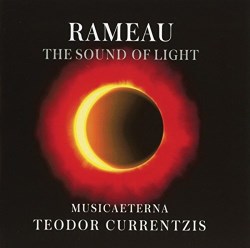
Jean-Philippe Rameau (1683-1764)
The Sound of Light
Nadine Koutcher (soprano)
Alexei Svetov (bass)
MusicAeterna (Orchestra and Choir)/Teodor Currentzis
rec. 2012, Diaghilev House, Perm, Russia
Texts and translations included
Sony Classical 88843 082572 [67]
This was less than enthusiastically received by my colleague JV on its release nine years ago; he declared that, “Currentzis’s approach is of no use to me, and I suspect I’m not alone in this. I want to hear Rameau’s music as he intended it to be played.” I can appreciate and understand his objections to the liberties the conductor takes here but am much more receptive to Currentzis’ approach simply because I find the results hugely involving and enjoyable; I can, after all, go elsewhere to numerous other recordings for a more “authentic” delivery of this wonderful music and am prepared to sacrifice any attachment to historically accurate performance practice in return for the sheer entertainment value of what is on offer. We are on a hiding to nothing if we aspire to recreating performances as the composer would have heard them centuries ago – and who is to say whether they would not have preferred to have had the resources of a modern orchestra to execute their scores? Nor am I especially bothered by the somewhat random selection of highlights which make up an eclectic programme of no apparent structure; I simply look upon it as a sequence of bon-bons featuring some of his best confections.
Chief among my pleasures – and here JV and I agree – is the contribution of Nadine Koutcher in a spellbinding rendering of the aria “Tristes apprêts” from the opera Castor et Pollux. She is also superb in the other three tracks in which she sings but this is the pearl which concludes the anthology; I urge you to sample it on YouTube to determine whether you find it as mesmerising as do I. Her assumption of the role of La Folie from Platée is hardly less of a vocal tour de force but sung in a very different, agile, frenetic style with demonic cackling – and it is preceded by a scarily discordant depiction of chaos. I also love the “hurdy-gurdy” effect generated by Currentzis’ admittedly large string ensemble in the opening Prélude – a rondeau from Les Fêtes d’Hébé – as it is such a raw, thrilling sound. One absolutely lovely number succeeds another; the music is so beautiful that the listener might fear overdose. The digital sound is very “up-front” and immediate but as such every instrumental strand is crystalline. There are, however, many instances when the orchestration is really quite spare, as in the flute and string account of the “Air tendre” from Zoroastre (track 6), contrasting tellingly with the ensuing Storm from Platée, then the stomping, timpani-heavy dance from Les Indes galantes, further enhanced by the contributions of Koutcher’s soprano and Alexei Svetov’s baritone and chorus. Nor do I at all mind the “illegitimate” inclusion of woodwind in the next track, La Poule, as I think they add colour and impact to the music – and it really is great fun.
The whole orchestra in full cry for the overture to Naïs and the next three tracks from Les Boréades, Les Indes galantes and Dardanus respectively really are a treat – but the energy displayed in all the purely orchestral sections here is so engaging.
My advice is to put preconceptions about authenticity aside and enjoy this recital for what it is – a life-enhancing homage and celebratory re-working of some of Rameau’s most enchanting pieces.
Ralph Moore
Previous review: Johan van Veen (August 2015)
Buying this recording via a link below generates revenue for MWI, which helps the site remain free


Contents
Les Fêtes d’Hébé:
Musette & Tambourin en rondeau pour Terpsichore [3:46]
Zoroastre:
Gavotte en rondeau [2:13]
Les Boréades:
Entrée pour les Muses, les Zéphyrs, les Saisons, les Heures et les Arts [7:01]
Les Indes galantes:
Chaconne [5:45]
Ballet des fleurs: Orage [0:44]
Zoroastre:
Air tendre en rondeau [2:22]
Platée:
Orage [1:51]
Les Indes galantes:
Danse du Grand Calumet de la Paix – Duo & Choeur: Forêts paisibles/ [3:40]
Jean-Philipp RAMEAU, arr anon
Concert en sextuor No. 6:
La Poule [5:56]
Jean-Philippe RAMEAU
Platée:
Récitatif & Ariette: Essayons du brillant – Aux langueurs d’Apollon [5:13]
Naïs:
Premier & Deuxième Rigaudon [2:15]
Zoroastre:
Ouverture [4:19]
Hippolyte et Aricie:
Prélude & Air accompagné: Temple sacré, séjour tranquille [2:45]
Naïs:
Ouverture [3:55]
Les Boréades:
Première et Deuxième Contredanse en rondeau pour les Peuples boréades [2:31]
Les Indes galantes:
Air pour les esclaves africains [1:47]
Dardanus:
Premier & Deuxième Tanmbourin pour les Peuples de différentes nations [2:16]
Castor et Pollux:
Prélude & Air accompagnée: Tristes apprêts [7:33]

















